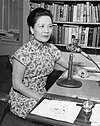
The Democratic Progressive Party (DPP) is a Taiwanese nationalist and centre-left political party in the Republic of China (Taiwan). Currently controlling both the Republic of China presidency and the unicameral Legislative Yuan, it is the majority ruling party and the dominant party in the Pan-Green Coalition as of 2023.

The Republic of China Armed Forces are the armed forces of the Republic of China (ROC). They consist of the Army, Navy, Air Force and Military Police Force. The military is under the civilian control of the Ministry of National Defense, a cabinet-level agency overseen by the Legislative Yuan.

Lee Teng-hui was a Taiwanese statesman and agriculturist who served as President of the Taiwan under the 1947 Constitution and chairman of the Kuomintang (KMT) from 1988 to 2000. He was the first president to be born in Taiwan, the last to be indirectly elected and the first to be directly elected. During his presidency, Lee oversaw the end of martial law and the full democratization of the ROC, advocated the Taiwanese localization movement, and led an ambitious foreign policy to gain allies around the world. Nicknamed "Mr. Democracy", Lee was credited as the president who completed Taiwan's transition to the democratic era.
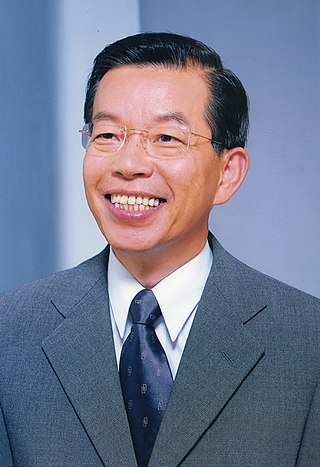
Frank Hsieh Chang-ting is a Taiwanese politician and former defense attorney. A cofounder of the Democratic Progressive Party, he has served on the Taipei City Council, the Legislative Yuan, as the mayor of Kaohsiung City, and as the Premier of the Republic of China under president Chen Shui-bian. Hsieh was the DPP nominee in the 2008 presidential election and was defeated by Ma Ying-jeou. Hsieh is currently the head of the Association of Taiwan-Japan Relations.

The following are considered holidays in Taiwan. Some are official holidays, and some are not:
The 1992 Consensus is a political term referring to the alleged outcome of a meeting in 1992 between the semiofficial representatives of the People's Republic of China (PRC) of mainland China and the Republic of China (ROC) of Taiwan. They are often credited as creating a diplomatic basis for semi-official cross-strait exchanges which began in the early 1990s and is a precondition set by the PRC for engaging in cross-strait dialogue.

Cross-Strait relations are the relations between China and Taiwan.

Tsai Ing-wen is a Taiwanese politician who has served as the president of the Republic of China (Taiwan) since 2016. A member of the Democratic Progressive Party (DPP), Tsai is the first female president of Taiwan. She served as chair of the DPP from 2020 to 2022, and also previously from 2008 to 2012 and 2014 to 2018.
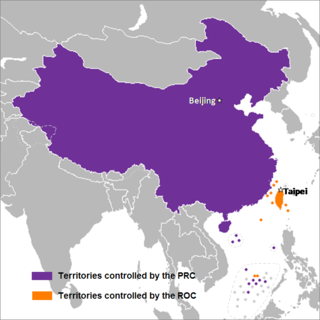
The term "Two Chinas" refers to the geopolitical situation where two political entities exist under the name "China".

Lin Chia-lung is a Taiwanese academic and Democratic Progressive Party (DPP) politician. He is the Secretary General to the President of Taiwan since 31 January 2023. He was elected mayor of Taichung City in November 2014 and took office on 25 December 2014. In the early 2000s he served in various capacities in the ROC Executive Yuan under DPP President Chen Shui-bian.

Luo Wen-jia is a Taiwanese politician. A member of the Democratic Progressive Party, Luo worked closely with Chen Shui-bian, first as Chen's legislative assistant, and later within Taipei City Government while Chen was mayor. When Chen was elected president in 2000, Luo joined the Executive Yuan as vice chairman of the Council of Cultural Affairs. Between 2002 and 2004, Luo was a member of the Legislative Yuan. He left the legislature for an appointment as head of the Council for Hakka Affairs, from which he stepped down in 2005 to run unsuccessfully for the Taipei County magistracy. Luo was subsequently defeated as a legislative candidate in 2008. Luo returned to politics in 2019, when he was named secretary-general of the Democratic Progressive Party.
Special non-state-to-state relations is a term used by Ma Ying-jeou, the former President of the Republic of China, to describe the nature of relations between the Taiwan Area and the Mainland China Area. President Ma has used the term at least once, although to describe the term as a concept or policy would be premature, especially as it describes those relations loosely in terms of what they are not.
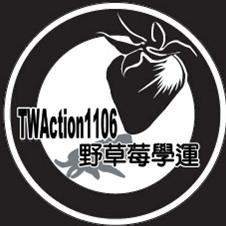
The Wild Strawberries Movement is a protest movement in Taiwan begun on 6 November 2008 after the visit of the People's Republic of China's ARATS chairman Chen Yunlin to the island. Police actions on protests aimed at Chen suppressed the display of Republic of China national flag and the playing of Taiwanese songs. This prompted a group of 400 students in Taipei, Taiwan to begin a sit-in in front of the Executive Yuan in protest of Taiwan's Parade and Assembly Act.
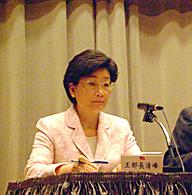
Wang Tsing-fong is a Taiwanese lawyer and politician.
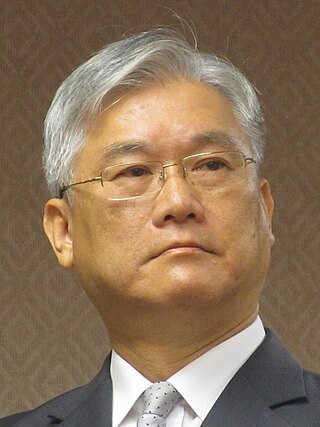
Andrew Hsia is a Taiwanese politician who is a vice chairman of the Kuomintang. He was minister of the Mainland Affairs Council from February 2015 to May 2016, and was Chairman of the Association of Foreign Relations (AFR) from 2017 to 2022.

Julian Kuo is a Taiwanese political scientist and politician who first served in the Legislative Yuan from 2002 to 2008 and was reappointed to the office in 2016.

Lee Wen-chung is a Taiwanese politician who served in the National Assembly from 1992 to 1999, then in the Legislative Yuan until his resignation in 2006.
Tsai Bih-hwang is a Taiwanese politician. He was elected to two nonconsecutive terms on the Legislative Yuan, serving from 1990 to 1993, and 1996 to 1999. Tsai was subsequently appointed to the Examination Yuan in 2002, and led the Examination Yuan's Civil Service Protection and Training Commission between 2010 and 2016.

Chen Chung-hsin is a Taiwanese journalist, editor, and politician.
Events from the year 2023 in Taiwan, Republic of China. This year is numbered Minguo 112 according to the official Republic of China calendar.




